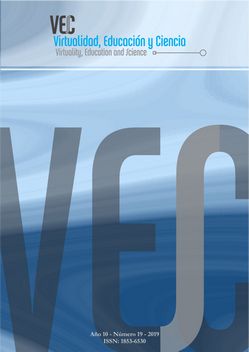Teaching Alternatives in Natural Sciences on Teacher Training: Opportunities of Field Trips using ITC resources
DOI:
https://doi.org/10.60020/1853-6530.v10.n19.24913Keywords:
field trip, learning mediated by ICT, teacher training in scienceAbstract
In this paper, an experimental process about possible alternatives in order to prepare a field trip using ITC is recovered. The process was carried out by a group of teachers and advanced students of the Natural Sciences Teaching Career at ISFDyT No.10 – Tandil. The composition of teacher teams with several educational trajectories allowed rethinking the pedagogical work towards the design of science teaching strategies based on the new learning methods of the students of the Teaching Career.Downloads
References
AGUERRONDO, I. (2009). Conocimiento complejo y competencias educativas. IIPE/UNESCO Sede Buenos Aires. Recuperado de http://www.ibe.unesco.org/en/services/publications/ibe-working-papers.html [02/12/2017].
CAMPANARIO, J. M. y MOYA, A. (1999) ¿Cómo enseñar ciencias? Principales tendencias y Propuestas. Grupo de Investigación en Aprendizaje de las Ciencias. Departamento de Física. Universidad de Alcalá de Henares. 28871 Alcalá de Henares. Madrid. Investigaciversidad de, 17(2). Recuperado de http://www2.uah.es/jmc/an11.pdf [09/12/2017].
CARRETERO, M. (1997). Constructivismo y educación. México: Editorial Progreso.
HARGREAVES, A. (2003). Enseñar en la sociedad del conocimiento (La educación en la era de la inventiva). Barcelona: Octaedro.
CABERO, J. (1996). Nuevas Tecnologías, Comunicación Y Educación. Edutec. Revista Electrónica de Tecnología Educativa. Número 1. Febrero. Universidad de las Islas Baleares. Sevilla. España. Recuperado de http://www.uib.es/depart/gte/revelec1.html [25/10/2017].
MOREIRA, M. A. (2013). Enseñanza de la física: aprendizaje significativo, aprendizaje mecánico y criticidad. Conferencia de apertura de la XI Conferencia Interamericana sobre Enseñanza de la Física. Guayaquil, Ecuador, 1 a 5 de julio de 2013. Revista Enseñanza de la Física. Recuperado de http https://revistas.unc.edu.ar/index.php/revistaEF/article/view/9515/10290 [22/10/2017]
ORION, N. (1986). A Fiel-Based High School Geology Course: Igneous and Metamorphic terrains – An Israeli Experience. Geology teaching Journal of the Association of Teachers of Geology. 11(1).
ORION, N. (2007). A Holistic Approach for Science Education For All. Eurasia Journal of Mathematics, Science & Technology Education. 3(2). pp. 111-118.
RUIZ ORTEGA, F. J. (2007). Modelos didácticos para la enseñanza de las ciencias naturales. Educrea. Recuperado de http://educrea.cl/modelos-didacticos-para-la-ensenanza-de-las-ciencias-naturales/. [13/12/2017].
UNESCO. (2004). Las Tecnologías de la Información y la Comunicación en la Formación Docente. Guía de Planificación. División Educación Superior. Recuperado de http://unesdoc.unesco.org/images/0012/001295/129533s.pdf. [18/10/2017].
ZEICHNER, K. (1987). Enseñanza reflexiva y experiencias de aula en la formación del profesorado. Revista de Educación, (282), pp. 161-189.
Downloads
Published
How to Cite
Issue
Section
License
The generation of derivative works is allowed as long as it is not done for commercial purposes. The original work may not be used for commercial purposes.


